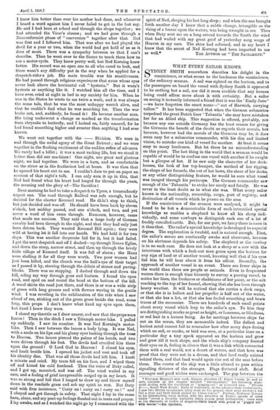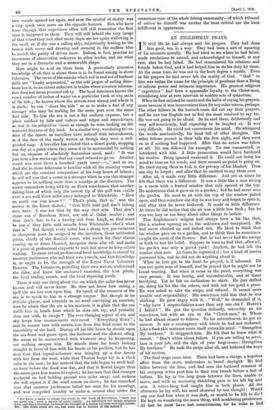WHAT EVERY SAILOR KNOWS.
SYDNEY SMITH somewhere describes his delight in the omniscience, or what seems to the landsman the omniscience, of the ordinary seaman. A sail was sighted on the horizon, and to the passengers on board the vessel with Sydney Smith it appeared to be nothing but a sail, nor did it seem credible that any human being could affirm more about it with certainty. But a sailor on seeing it instantly informed a friend that it was the 'Emily Jane —we have forgotten the exact name—" out of Harwich, carrying tallow." It has been suggested that when the German submarine torpedoed the great Dutch liner Tubantia she may have mistaken her for an Allied ship. This suggestion is offered, probably, not because any one outside Germany has the least reason for giving the Germans the benefit of the doubt as regards their morals, but because, however bad the morals of the Germans may be, it does seem easy for a submarine commander, with his dim and limited vision, to mistake one kind of vessel for another. At least it seems easy to many landsmen. But let there be no misunderstanding on this point. The last thing in the world that a seaman would be capable of would be to confuse one vessel with another if he caught but a glimpse of her. If he saw only the character of her deck- houses, the look of her top-hamper, the method of her rigging, the shape of her funnels, the cut of her bows, the sheer of her decks, or any other distinguishing feature, he would be sure what vessel
was imaged through his periscope. The German commander saw enough of the Tubantia to strike her surely and fatally. He was never in the least doubt as to what she was. What every sailor knows is the nationality, ownership, cargo, port of registry, and destination of all vessels which he passes on the seas.
If the omniscience of the seaman were analysed, it might be found to be but a demonstrable form of such intensified special knowledge as enables a shepherd to know all his sheep indi- vidually, and some cowboys to distinguish each one of a lot of freshly corralled cattle. But, for our part, we fancy there is more in it than that. The sailor's special knowledge is developed to a special degree. The explanation is twofold, and is natural enough. First, the sailor's senses are continually awake and observant, because on his alertness depends his safety. The shepherd or the cowboy is in no such case. He does not look at a sheep or a cow with the intentness with which a look-out man gazes upon the horizon for any sign of land or of another vessel, knowing well that if his eyes fail him he will hear about it from his officer. Secondly, the approach of another vessel is an event. There are fewer ships in the world than there are people or animals. Even in frequented waters there is enough time leisurely to survey a passing vessel, to notice her lines, the freshness or shabbiness of her paint, or the salt reaching to the top of her funnel, showing that she has been through heavy weather. It will be noticed that she carries a deck cargo, or that she is in ballast and her propeller is half out of the water, or that she has a list, or that she has fouled something and bears traces of the encounter. There are hundreds of such small points about every vessel which leap to the sailor's eye. To him they are distinguishing marks as great as height, or lameness, or blindness, or red hair in a human being. As for meetings between ships far out on the ocean, they are memorable indeed. The dullest and haziest mind cannot fail to remember how after many days during which no sail, or smoke, or bird was seen, at a particular time on a particular day a tiny speck appeared on the horizon and grew and grew till it took shape, and the whole ship's company feasted their eyes on it, feeling in silence that it was a link which connected them with a real world, net a desert of waters, and that here was proof that they were not in a dream, and that land really existed behind them, and that land would again rise out of the seas before them. The course of the ship was a little altered to pass within signalling distance of the stranger. Flags fluttered aloft. Brief messages and good wishes were exchanged. The gap between the • Professor Morgans new work, German Atrocities (T. Fisher Unwln, 23. and Is. not), contains in the chapter entitled " Documentary," the following state. meat dealing with the crucifixion or " pegging out" of wounded men. " Private IS—, Royal West Kente : Early in September, in the advance from Conlonimlere, I saw two British cavalrymen lying dead on the ground, their arms stretched out like a cross and their hands pinned by Uhian lance." Further, Professor Morgan In his introduction, when dealing with the atrocitiss In France, speaks of cases which " reveal a leisurely barbarity which proves great deliberation ; cases such as the discovery of bodies of despatch-riders burnt with petrol or ' pegged out' with lauces."—ED. &pedalo:.
two vessels opened out again, and soon the symbol of reality was a tiny speck once more on the opposite horizon. Men who have keen through that experience often will still remember the first time it happened to them. They will still behold the very image of that vessel they met after many days, see her again wallowing in the swell, or, if she was a sailing ship, majestically leaning to the breeze with every sail drawing and seeming in the endless blue to match the purity of driven snow. Sailors, in fact, practise an intentness of observation unknown to other trades, and see what they see in a dramatic and a memorable shape.
More might be said on these lines. A particularly intensive knowledge of all that is about them is to be found among in-shore fishermen. The crews of the smacks which sail in and out of harbour daily are "locally acquainted," as the odd jargon of sailing direc- tions has it, to an extent unknown in trades where accurate informa- tion does not mean personal safety. The local fisherman knows the exact number of inches of water on a particular lank at any state of the tide ; he knows where the stream runs strong and where it is slack ; he can " cheat the tide" so as to make a fool of any stranger who may be making for the same port over the same foul tide To him the sea is not a flat uniform expanse, but a place marked by hills and valleys and ridges and swatchways, as real in his subjective vision as though he were looking on the material features of dry land. In a similar way, wandering trit es- men of the desert, as travellers have noticed with astonishment, red the face of the sandy wastes as though they were a well- printed map. A traveller has related that a desert guide, stopping one day at a point where they seem:d to be surrounded by nothing but an expanse of absolutely featureless sand, said : "It was just here a few weeks ago that my camel refused to go on. Another camel was over there a hundred yards away—," and so on.
And the in-shore fisherman is familiar with all the coasting vessels which are the constant companions of his long hours of labour ; he will tell you that a vessel is a stranger when to you this stranger appears to be nothing more than a smudge in the distance. The writer remembers being told by an Essex sma.cksman that another fishing-boat of which only the merest tip of the gaff was isible over a sea-wall three miles away belonged to Whitstable. "How on earth can you lmow ? " "That's plain, that is," was the answer in the Essex dialect ; "that little ould gaff don't belong near here. I can see that by the way that sets. That don't come out o' Burnham River, nor out o' Coins neither ; and that don't fare to be a bawley sail from Leigh, so that must be one o' they little ould smacks from Whitstable—that's what that is." But though every sailor has a sharp eye, pre-eminence in sharpness must be assigned to the hovellers, those unlicensed pilots, chiefly of the Kentish coast, who watch for their clients coming up or down Channel, recognize them afar off, and make it a point of professional etiquette to wait but never to keep others waiting. To some extent professional local knowledge is shared by amateur yachtsmen who sail their own vessels, and this knowledge is, or ought to be, the strength of the Royal Naval Volunteer Reserve. The Volunteers, patrolling their own waters, understand the tides, and know the unchaste 1 swatches, the best pilots, the local trading vessels, and the local repairing yards.
There is only one thing about the sea which the sailor has never known and will never know. He does not know how strong a spell the sea has cast upon him. To speak of the romance of the sea is to speak to him in a strange tongue. But though in no definite phrase, and certainly in no word conveying an emotion, does he admit that the sea is his mistress, it is plain that the sea holds him in bonds from which he does not try, and probably does not wish, to escape.* The ever-changing aspect of sea and sky keeps him unconsciously entranced. "Everything flows " ; and he cannot turn with satisfaction from this fluid scene to the immobility of the land. During all his idle hours he stands upon the sea-front and gazes upon the harbour and the distant offing.
He seems to be unconcerned with whatever may be happening, yet nothing escapes him. He stands there for hours looking straight in front of him with his hands in his pockets, but he has seen that that topsail-schooner was bringing up a fine breeze with her from the west, while that Thames barge lay in a clock calm to the east; he has noticed that the tide began to swell half- an-hour before the flood was due, and that it flowed longer than the moon gave him reason to expect ; he has seen that that stranger anchored on bad holding ground two miles away, and reckons she will repent it if the wind comes on-shore ; he has remarked that that amateur yachtsman luffed too soon for his moorings, and was compelled humbly to make a second shot under the
• We knew a sailor to whom the words in the Book of Revelation, " there was co more sea," were a source of acute misery. An unlettered but deeply religious man, and also • literalist, he found the thought of • sealess universe well-nigh intoler- Me. The Bible could not err, but what was to become of the Billion
censorious eyes of the whole fishing community—of which tribunal of critics he himself was neither the least critical nor the least indifferent in appearance.































 Previous page
Previous page